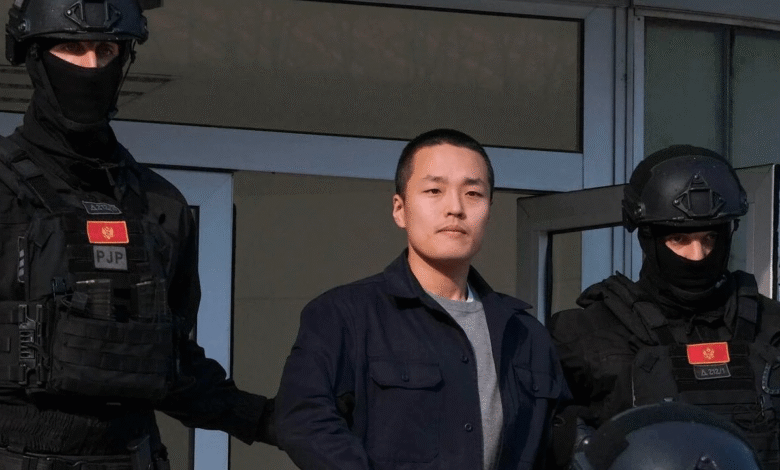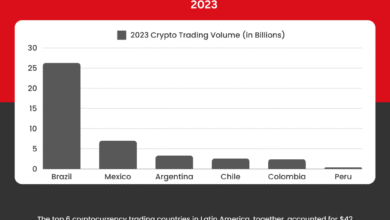Do Kwon Guilty Plea: What It Means for Global Crypto Markets

The news surrounding Do Kwon’s guilty plea sent shockwaves through the cryptocurrency community, as the co-founder of Terraform Labs admitted to his involvement in one of the largest financial frauds in digital asset history. In a Manhattan federal court, Kwon acknowledged his role in conspiring to commit various forms of fraud, an act that highlights the devastating implications of crypto fraud on investor protection and market credibility. His case, emblematic of the urgent need for global crypto regulation, raises significant concerns about the risks associated with algorithmic stablecoins and other complex financial products. As authorities intensify their scrutiny, Kwon’s plea serves as a stark reminder of the potential repercussions for those who mislead investors, amplifying discussions around crypto extradition risks and the need for stringent oversight. The fallout from this case is likely to reverberate across the industry, impacting how regulators approach the rapidly evolving landscape of digital currencies.
The recent developments involving Do Kwon’s admission of guilt signify a monumental shift in the scrutiny faced by cryptocurrency ventures and their founders. By pleading guilty to serious charges linked to financial misconduct, Kwon’s actions shine a light on the broader implications for investor trust and regulatory frameworks in the crypto space. As the legal landscape evolves, the ramifications point towards a more robust system of checks aimed at safeguarding investors within this decentralized economy. The growing prevalence of fraud in the cryptocurrency sector underscores the urgency for enhanced international cooperation and regulations that can effectively address these challenges. This case illustrates that even high-profile figures in the industry are not immune to the legal consequences of their actions, paving the way for stricter accountability in digital finance.
Do Kwon’s Guilty Plea: Implications for Crypto Fraud
Do Kwon’s guilty plea on fraud charges marks a significant turning point in the cryptocurrency space, as it shines a light on the darker side of crypto operations. His admission of guilt regarding conspiracy to commit multiple forms of fraud reflects a troubling pattern in the industry—where marketing hype often distracts from the underlying risks of digital assets. The charges, particularly those brought by the U.S. Attorney’s Office, signal a shift toward stricter enforcement against deceptive practices that have become prevalent in the decentralized finance sector. As Kwon’s case unravels, it underscores the urgent need for greater transparency and accountability in crypto projects.
The implications of Kwon’s actions reach far beyond personal accountability, raising critical questions about investor protection in the cryptocurrency arena. His plea not only jeopardizes his future but also places immense pressure on other crypto entrepreneurs to reconsider their operational transparency. The Department of Justice has made it clear that such fraudulent misrepresentations will not be tolerated, thereby imposing a new standard for compliance that could deter future infractions. As regulatory frameworks continue to evolve, we can expect to see an increased emphasis on investor safeguarding in crypto offerings.
The Impact of Do Kwon on Global Crypto Regulation
Kwon’s case serves as a pivotal moment for the global regulatory landscape surrounding cryptocurrencies. By holding Kwon accountable for his actions, regulators around the world may feel emboldened to implement stricter laws and guidelines to govern crypto activities. This event potentially paves the way for comprehensive regulatory measures that will encompass everything from crypto issuance to trading practices, creating a more structured environment for both investors and issuers. With Kwon’s guilty plea, the international community has a poignant example of what can happen when compliance is ignored and fraud takes center stage.
As countries reevaluate their stance on cryptocurrency regulation, the Terraform Labs scandal has effectively put the spotlight on the need for harmonized global regulations. Stakeholders are advocating for laws that not only protect investors but also allow legitimate crypto projects to flourish without the burden of unnecessary bureaucracy. In shaping the future of crypto regulation, Kwon’s plea may catalyze a more unified approach to safeguarding market integrity, ensuring that the principles of transparency and fairness are upheld in all jurisdictions.
Understanding Investor Protection in Cryptocurrency
Kwon’s guilty plea raises pivotal issues surrounding investor protection in the cryptocurrency market. As we’ve seen in this case, misrepresentation of crypto assets can lead to devastating losses for unsuspecting investors who are often less informed about the inherent risks involved. The fallout from Terraform Labs has shown that investors need robust protection mechanisms, especially given the sometimes volatile nature of digital assets. This plea essentially serves as a warning to both existing and aspiring investors about the necessity for thorough due diligence before engaging with any crypto projects.
The landmark case undeniably emphasizes the importance of transparent disclosures in fundraising and marketing within the crypto space. Regulatory bodies are beginning to signal that they will hold crypto issuers accountable to the same standards as traditional financial markets. Investors should now be more vigilant in their investment approaches, demanding clarity and full disclosure of risks from companies targeting them. The propagation of investor protection laws could help mitigate the risks associated with investing in complex assets, fostering greater trust and participation in the cryptocurrency market.
Crypto Extradition Risks and International Enforcement
The extradition of Do Kwon from Montenegro serves as a stark reminder of the risks associated with international cryptocurrency operations. The case illustrates that geographical relocation and offshore structures cannot shield fraudulent activity from vigilant international law enforcement. The cooperation between U.S. and foreign authorities to bring Kwon to justice emphasizes the effectiveness of global collaboration in combating crypto crimes. Consequently, crypto entrepreneurs must remain aware of the legal ramifications of their actions, particularly when they involve U.S. investors or markets.
As more jurisdictions collaborate on cross-national fraud cases, the implications for crypto businesses are profound. Entrepreneurs must consider the potential legal consequences that could arise, not only in their home jurisdictions but also abroad. This elevated scrutiny calls for a closer examination of operational frameworks and compliance measures to minimize exposure to extradition risks. Kwon’s case could set a precedent that encourages other nations to align with U.S. enforcement efforts, ramping up the complexities involved in operating a cryptocurrency business across borders.
Setting Precedents in Cryptocurrency Regulation
Do Kwon’s guilty plea is likely to set significant precedents in how algorithmic stablecoins and token economies are regulated. By classifying Kwon’s actions as fraudulent under traditional financial laws, this case challenges the crypto industry to conform to the same standards that govern conventional financial systems. This shift will compel regulators to refine their approaches, tailoring existing laws to address the unique aspects of digital assets while ensuring accountability among their issuers and managers. The precedent established here might very well deter future fraudulent schemes, as stakeholders recognize the legal ramifications of misrepresenting financial products.
As regulators grapple with the complexities of cryptocurrency, Kwon’s case will serve as a vital reference point. It reinforces the notion that cryptocurrencies are indeed subject to regulatory scrutiny akin to that faced by other financial instruments. This can instigate a cultural shift within the crypto community, where greater emphasis is placed on compliance, ethical marketing practices, and investor education. As a result, the market could witness a resurgence of credibility as firms adopt more responsible practices in the wake of Kwon’s fraud case.
The Future of Cryptocurrency and Legal Compliance
In light of Do Kwon’s guilty plea, companies in the cryptocurrency space must rethink their compliance strategies. The legal landscape is rapidly evolving, with increasing pressure from both regulators and investors demanding transparency and ethical conduct. Companies must prioritize developing robust compliance frameworks that ensure adherence to regulatory requirements and safeguard against potential fraud. This includes conducting thorough assessments of marketing practices and ensuring that all disclosures are accurate and comprehensive to mitigate risks associated with misrepresentation.
Looking ahead, the roadmap for crypto businesses will likely involve a greater emphasis on legal compliance and ethical practices to align with the expectations set forth by regulators. The repercussions of Kwon’s case emphasize the necessity for cryptocurrency firms to engage with legal experts to navigate this complex landscape effectively. As compliance becomes more critical, companies that proactively seek to establish transparent, fair practices will be better prepared to thrive amidst increasing regulatory scrutiny and protect their investors.
Legal Advice for Cryptocurrency Ventures Post-Kwon
The fallout from Do Kwon’s guilty plea serves as a crucial lesson for all cryptocurrency ventures. As businesses navigate this complex environment, seeking legal counsel has never been more critical. Legal experts can provide guidance on compliance, regulatory strategies, and the importance of full transparency in offerings. By incorporating these practices, companies can not only avoid pitfalls associated with misrepresentation but also build trust with their investors and stakeholders.
In addition, ongoing legal education for crypto entrepreneurs about the evolving regulatory landscape is essential. With cases like Kwon’s illustrating the far-reaching implications of fraud, there is a growing urgency for startups and established firms alike to develop comprehensive risk assessments and compliance strategies. Engaging with specialized legal services can aid businesses in mitigating potential risks and fostering sustainable growth in the ever-changing cryptocurrency market.
Navigating the Risks of Algorithmic Stablecoins
Kwon’s role in the collapse of Terraform Labs raises significant concerns surrounding algorithmic stablecoins. These financial instruments, designed to maintain a stable value without traditional collateral, come with inherent risks that must be disclosed clearly to investors. With Kwon admitting to crafting an illusion of stability that relied on deceptive practices, the message is clear: investors must exercise caution and seek comprehensive information before engaging with such products. The case highlights the need for improved disclosure practices to protect investors from future losses.
As algorithmic stablecoins continue to gain popularity, understanding the underlying mechanisms becomes essential for investors. Relying on thorough due diligence and informed participation will help mitigate the risks associated with these innovative but complex financial products. The cryptocurrency industry’s move towards greater transparency following Kwon’s plea could empower investors and lead to a more stable market environment, fostering confidence in new ventures centered around algorithmic finance.
Conclusion: Lessons from the Do Kwon Case
The case of Do Kwon and Terraform Labs offers invaluable lessons for the cryptocurrency ecosystem. His guilty plea not only highlights the consequences of fraudulent behavior but also accentuates the critical need for enhanced regulatory oversight in this rapidly evolving sector. Stakeholders must recognize that the absence of stringent regulations can lead to disastrous outcomes for investors, and that acting ethically and transparently is paramount in gaining market trust.
As the cryptocurrency market matures, it will undoubtedly adapt in response to these lessons. Regulatory bodies will likely tighten frameworks, and industry participants will become increasingly aware of the implications of their actions. The Do Kwon case exemplifies both the risks of operating in the crypto space and the accountability that comes with it, setting a foundation for a more secure and compliant marketplace moving forward.
Frequently Asked Questions
What are the implications of Do Kwon’s guilty plea for investor protection in crypto?
Do Kwon’s guilty plea highlights significant implications for investor protection in the cryptocurrency sector. It underscores the legal accountability associated with misrepresenting a crypto-asset’s functionality, reinforcing the need for full disclosure on risks. As a result, digital asset issuers must ensure that their marketing claims and disclosures are rigorously scrutinized to avoid legal repercussions, fostering greater investor trust in the crypto market.
How does Do Kwon’s guilty plea affect global crypto regulation?
Do Kwon’s guilty plea is a landmark case that could influence global crypto regulation by establishing a precedent for how algorithmic stablecoins and complex crypto products are assessed under existing financial laws. This case may prompt regulators worldwide to implement stricter oversight and compliance standards, ensuring greater investor protection and transparency within the rapidly evolving crypto landscape.
What can we learn from Do Kwon’s guilty plea regarding crypto fraud implications?
The implications of Do Kwon’s guilty plea serve as a critical reminder of the potential for severe consequences in the crypto space. It illustrates how deceptive practices can lead to massive financial losses for investors and highlights the role of law enforcement in tackling financial fraud within the cryptocurrency sector. Stakeholders are urged to adopt best practices in transparency and compliance to mitigate fraud risks.
What are the extradition risks for crypto entrepreneurs, as shown by Do Kwon’s case?
Do Kwon’s extradition from Montenegro demonstrates the increasing collaboration between international law enforcement agencies, reflecting heightened extradition risks for crypto entrepreneurs involved in fraudulent activities. Jurisdictional barriers are less effective in shielding individuals from prosecution, particularly when their actions impact global markets, emphasizing the need for legal awareness among international crypto operators.
How does Do Kwon’s case set a precedent for the treatment of algorithmic stablecoins?
Do Kwon’s guilty plea is poised to set a significant precedent regarding the regulatory treatment of algorithmic stablecoins and similar crypto products. By failing to uphold transparency and truthfulness about their economic foundations, the industry now faces increased scrutiny and the potential for stricter regulatory frameworks, which will impact how future projects are developed and marketed.
| Key Point | Details |
|---|---|
| Do Kwon’s Guilty Plea | Kwon pleaded guilty to charges including commodities fraud and wire fraud on August 12, 2025. |
| Misrepresentation of Crypto Products | Terraform Labs marketed its ecosystem as decentralized while using deceptive practices to maintain stability, impacting billions in investments. |
| Legal Consequences for Crypto Misrepresentation | The case highlights the serious implications for digital asset issuers failing to disclose material facts, which can lead to fraud charges. |
| International Cooperation in Enforcement | Kwon’s extradition from Montenegro shows the U.S. ability to prosecute fraud on a global scale, irrespective of the defendant’s location. |
| Regulatory Implications for Crypto Markets | The guilty plea sets a precedent for how algorithmic stablecoins and token mechanics are assessed, increasing scrutiny in the industry. |
Summary
Do Kwon’s guilty plea marks a significant moment in the global cryptocurrency landscape. As a co-founder of Terraform Labs, Kwon has admitted to serious charges of financial fraud, sending ripples through market confidence and regulatory frameworks. This case not only illustrates the legal consequences of misrepresenting crypto products but also sets a critical precedent for future enforcement actions in the sector. Stakeholders in cryptocurrencies must take heed of the implications of this case, ensuring rigorous compliance with disclosure standards to avoid similar repercussions.




